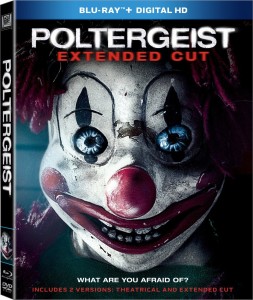 You’ve a better chance at getting a visit from a real poltergeist than finding a major Hollywood studio releasing a big budget horror movie. These days, most movie frights are provided by indies that find a way to keep you up all night with small budgets and relative unknowns in the lead roles. For a good example of a superior scary indie flick, see last spring’s It Follows. With a simple premise and a great cast, this low budget gem still causes me to lose sleep at night.
You’ve a better chance at getting a visit from a real poltergeist than finding a major Hollywood studio releasing a big budget horror movie. These days, most movie frights are provided by indies that find a way to keep you up all night with small budgets and relative unknowns in the lead roles. For a good example of a superior scary indie flick, see last spring’s It Follows. With a simple premise and a great cast, this low budget gem still causes me to lose sleep at night.
Still, nothing beats seeing Hollywood stars being put through the ringer backed by top-notch special effects. Ask anyone to name the best Hollywood horror movies in the past 40 years, and 1982’s Poltergeist would be in the top ten. Each October when the Tobe Hooper/Steven Spielberg classic shows up on basic cable, I get sucked in and have regular nightmares.
With the trend of remakes and reboots, it was inevitable that Poltergeist would get remade. I had hopes for this one, especially considering that Sam Raimi and Robert Tapert (Evil Dead, Drag Me to Hell) were producing, and Gil Keenan, director of the spooky and very Spielberg-esque Monster House, was at the helm. Unfortunately, my hopes were only half fulfilled, as this is an uneven and underwhelming movie.
Sam Rockwell and Rosemarie DeWitt, both exceptional actors, take on the roles of Eric and Amy Bowen, husband and wife and parents of teenager Kendra (Saxon Sharbino), tweener Griffin (Kyle Catlett) and youngster Madison (Kennedi Clements). The Bowens are down on their luck, as Eric has recently been laid off and they’re moving into a new neighborhood to start over (apparently because of Eric’s severance package, because Amy is a stay-at-home mom and writer). They buy a foreclosed house and almost immediately the presence of something supernatural is revealed. Madison’s closet door has a strange electromagnet current, all of the electronics are always on the blink, and black goo seeps from under the washing machine.
Surprisingly, Eric and Amy don’t pay much attention to weird happenings in their house, I suppose writing it off as glitches that come with buying a cheap house. But Griffin and Madison are fully aware that there’s something off about their quiet suburban home located right next door to some power lines. Midway through the film, Eric and Amy attend a dinner party with some snobbish neighbors who reveal that the house was built on the site of on old cemetery. Although the city assured homeowners that the graves and bodies were all moved (”to a nice neighborhood,” quips one of the dinner guests), we the audience knows better.
Following the major beats of the original Poltergeist, Madison disappears into the ghost dimension and the Bowens must track down some parapsychologists to help them get her back. When their efforts fail, they call upon a TV ghost hunter played by Jared Harris, here taking on the part that Zelda Rubenstein made so memorable in 1982. All of them must unite to battle the pissed off ghosts whose resting places were defiled by greedy homebuilders.
Technically speaking, there’s nothing to complain about in Poltergeist. Keenan has a gift for keeping the momentum flowing, using the camera to hold for dramatic pauses, and swoop around, and creating a dizzying effect on the moviegoer. The entire cast is strong. Rockwell, DeWitt and Harris could recite an oatmeal recipe and make it interesting. The real discovery of the film is Kyle Catlett, who has a very expressive face and is able to convey a range of emotions without much dialogue. Much of the film rests on this young actor’s shoulders, as he becomes the central character tormented by the house and ultimately the hero.
What fails the movie is the screenplay, which goes to such great pains to make the Bowens a family so down on their luck that you can’t help but root for them. But it’s tough rooting for them because they’re all so wrapped up in themselves, especially Eric, Amy and Kendra. Perhaps this is some commentary about modern society on the part of screenwriter David Lindsay-Abaire, but mom and dad come off as jerks several times in the movie, as well as irresponsible.
The filmmakers smartly incorporate modern technology into the story, but go too far in the climactic sequence, as a drone camera takes us into the ghost dimension. Part of the allure of the original (and many older horror films) is what’s left to our imagination. In the original, JoBeth Williams enters the dark dimension to rescue her daughter and she disappears for a minutes. We’re left to conjure up what she might be experiencing. In the new Poltergeist, we see it all, and frankly it feels a little clichÁ©.
There are some great scares in Poltergeist, no doubt. Keenan certainly knows how to frame a scene and keep you on the edge of your seat. But the lack of any character depth sinks the film. In the end, I didn’t care much about the Bowen family, and I only wanted them to get out of the house so the movie would end.
The Blu-ray release comes with two versions of the movie, the theatrical cut and an extended version.





Comments